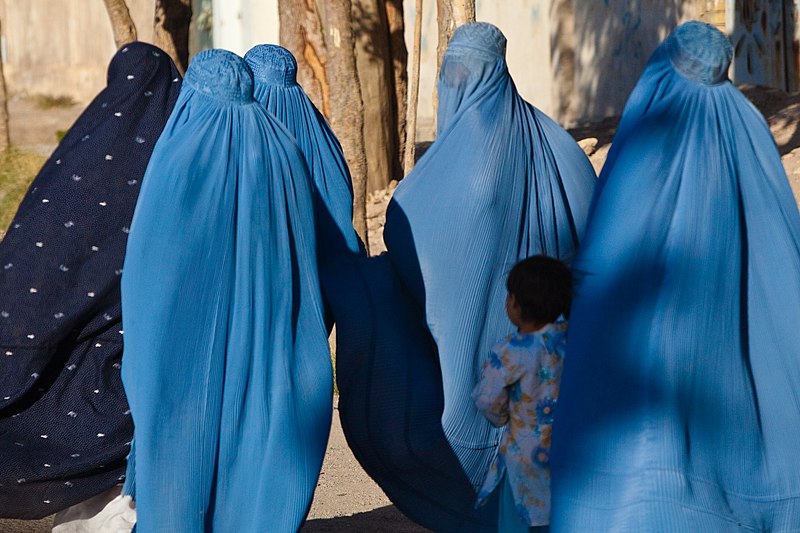An Afghan broadcaster aired a rare all-female panel in a program segment to mark International Women’s Day. The airing of the discussion comes in the midst of increasingly restrictive policies by the Taliban administration in Afghanistan.
Afghanistan’s Tolo News on Wednesday marked International Women’s Day by airing an all-female panel with an audience of women in light of the occasion. The panel was a rare broadcast since the insurgent group retook control of Afghanistan on the heels of the West’s military withdrawal in August 2021. With their faces almost completely covered, the panel, made up of three women and one female moderator, discussed women’s place in Islam.
“A woman has rights from an Islamic point of view…it is her right to be able to work, to be educated,” said journalist Asma Khogyani.
“Whether you want it or not, women exist in this society…if it’s not possible to get an education at school, she will learn knowledge at home,” said former university professor Zakira Nabil, noting that women would continue to find ways to learn and work.
75 percent of female journalists lost their jobs since the Taliban retook control of Afghanistan in 2021, according to a 2022 survey by Reporters Without Borders. The International Labor Organization said that in 2022 and since mid-2021, female employment in Afghanistan fell by 25 percent because of the growing restrictions the insurgent group has placed on women and because of Afghanistan’s economic crisis.
The United Nations Mission to Afghanistan has since called on the Taliban to reverse its restrictions on women and girls, describing such policies as “distressing.” The insurgent group last year ordered a ban on most girls from attending high school and universities, as well as barring women from participating in aid work.
Universities in Afghanistan have reopened following the winter break, but the barring of women from attending was still in effect. The ban on female university students was due to the Taliban’s accusation that girls were flouting the strict dress code and that they were going to school without being accompanied by a male relative to and from the campus.



 Jack Lang Resigns as Head of Arab World Institute Amid Epstein Controversy
Jack Lang Resigns as Head of Arab World Institute Amid Epstein Controversy  South Korea Assures U.S. on Trade Deal Commitments Amid Tariff Concerns
South Korea Assures U.S. on Trade Deal Commitments Amid Tariff Concerns  U.S. Lawmakers to Review Unredacted Jeffrey Epstein DOJ Files Starting Monday
U.S. Lawmakers to Review Unredacted Jeffrey Epstein DOJ Files Starting Monday  U.S. Announces Additional $6 Million in Humanitarian Aid to Cuba Amid Oil Sanctions and Fuel Shortages
U.S. Announces Additional $6 Million in Humanitarian Aid to Cuba Amid Oil Sanctions and Fuel Shortages  Trump Endorses Japan’s Sanae Takaichi Ahead of Crucial Election Amid Market and China Tensions
Trump Endorses Japan’s Sanae Takaichi Ahead of Crucial Election Amid Market and China Tensions  Japan Election 2026: Sanae Takaichi Poised for Landslide Win Despite Record Snowfall
Japan Election 2026: Sanae Takaichi Poised for Landslide Win Despite Record Snowfall  Netanyahu to Meet Trump in Washington as Iran Nuclear Talks Intensify
Netanyahu to Meet Trump in Washington as Iran Nuclear Talks Intensify  New York Legalizes Medical Aid in Dying for Terminally Ill Patients
New York Legalizes Medical Aid in Dying for Terminally Ill Patients  US Pushes Ukraine-Russia Peace Talks Before Summer Amid Escalating Attacks
US Pushes Ukraine-Russia Peace Talks Before Summer Amid Escalating Attacks  Ohio Man Indicted for Alleged Threat Against Vice President JD Vance, Faces Additional Federal Charges
Ohio Man Indicted for Alleged Threat Against Vice President JD Vance, Faces Additional Federal Charges  Trump’s Inflation Claims Clash With Voters’ Cost-of-Living Reality
Trump’s Inflation Claims Clash With Voters’ Cost-of-Living Reality  Trump Signs “America First Arms Transfer Strategy” to Prioritize U.S. Weapons Sales
Trump Signs “America First Arms Transfer Strategy” to Prioritize U.S. Weapons Sales  China Warns US Arms Sales to Taiwan Could Disrupt Trump’s Planned Visit
China Warns US Arms Sales to Taiwan Could Disrupt Trump’s Planned Visit  TrumpRx Website Launches to Offer Discounted Prescription Drugs for Cash-Paying Americans
TrumpRx Website Launches to Offer Discounted Prescription Drugs for Cash-Paying Americans  Pentagon Ends Military Education Programs With Harvard University
Pentagon Ends Military Education Programs With Harvard University  India–U.S. Interim Trade Pact Cuts Auto Tariffs but Leaves Tesla Out
India–U.S. Interim Trade Pact Cuts Auto Tariffs but Leaves Tesla Out  Norway Opens Corruption Probe Into Former PM and Nobel Committee Chair Thorbjoern Jagland Over Epstein Links
Norway Opens Corruption Probe Into Former PM and Nobel Committee Chair Thorbjoern Jagland Over Epstein Links 































